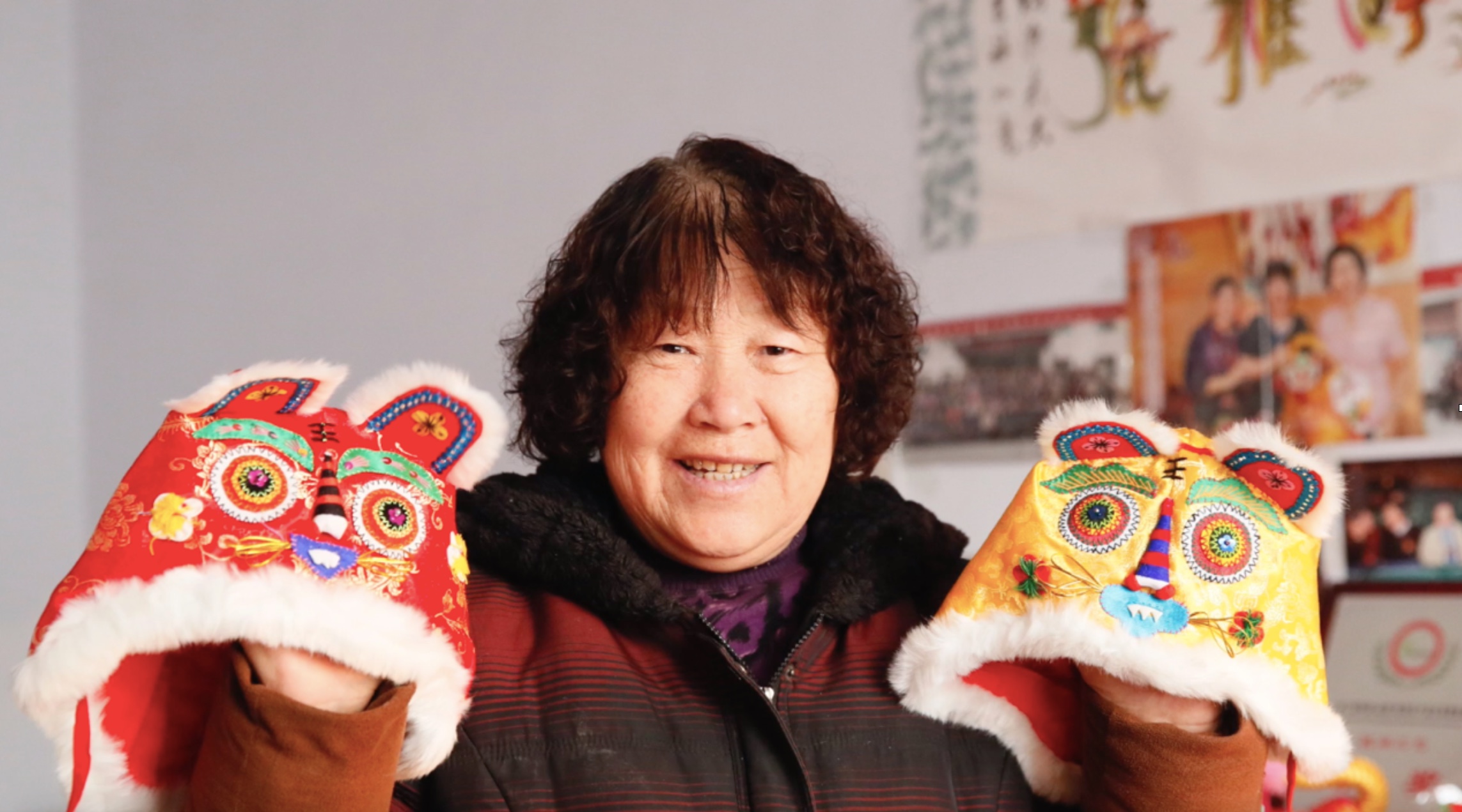


A woman holds tiger hats, a popular purchase on Taobao ahead of Lunar New Year festivities. Photo credit: Alibaba Group
This week, Alibaba Group’s online marketplace Taobao released the top 10 holiday purchases for the upcoming Lunar New Year, including floor cleaning machines, tiger-themed items and ski suits.
Meanwhile, Taobao’s 2021 Senior Shopping Habits Report shows that seniors in China follow the same trends as young people.
In other news, Cainiao Network announced the launch of a direct daily China-Vietnam chartered flight to safeguard Lazada’s cross-border logistics ahead of Vietnam’s Lunar New Year.
Holiday Shopping For the Lunar New Year? Check Out Taobao’s Top 10 List
Wondering what to buy for the Lunar New Year? Check the Top 10 list released by Taobao, Alibaba’s online marketplace, based on search statistics, sales figures and gross merchandise volume.
Traditional food items top the must-haves list, alongside modern snow sports equipment like ski suites and snowboards popularized by the upcoming Winter Olympics in Beijing.
With the Year of the Tiger around the corner, it’s no surprise that anything tiger-related is flying off the shelves. Searches for tiger-themed hoodies and bags jumped 500% month-on-month, while consumers are buying 257,000 tiger-themed phone cases every day.
Rounding out the list are items for everyday living. Floor cleaning machines that can make it easier to do household chores are highly ranked. So are pre-made foods that are easy to cook.
Elderly Consumers Stay on Trend
Shopping at 5 am, a penchant for cosmetics and an interest in healthy foods. This is a profile of senior Chinese consumers, distilled from data collected throughout the year on Taobao and published in the platform’s 2021 Senior Shopping Habits Report.
China has more than 264 million people aged 60 or over, accounting for 18.7% of the population, according to a 2020 census. Understanding their shopping habits has become increasingly important for e-commerce platforms like Taobao.
Seniors are more health-conscious, shown in their preference for buying health supplements like Goji berries and black sesame bowls. But they are also trend-followers, given that they also purchase the disposable face towels and gloss lipsticks favored by China’s youth.
When it comes to beauty, they prefer moisturizing cosmetics and dark spots treatments. But unlike young people, they also love to buy electronic toys – for their grandchildren, that is.
Taobao is making itself senior-friendly. The platform rolled out a new version of the shopping app in the fall with larger text and icons, simplified navigation and voice-assisted technology. More updates are expected later this year.
Cainiao Launches Daily Chartered Flight to Safeguard Lazada Cross-Border Logistics Stability Ahead of Lunar New Year
Cainiao Network, Alibaba’s logistics arm, announced the launch of a direct daily China-Vietnam chartered flight this week to safeguard the stability of Lazada’s cross-border logistics ahead of Vietnam’s Lunar New Year, also known as Tết.
Traveling from Nanning in southwest China to Ho Chi Minh City in Vietnam, the flight serves as an alternative to truck transportation amid current road congestions in Vietnam, following the country’s lockdown and quarantine measures.
The daily flight will carry Lazada’s e-commerce goods and provide additional capacities in anticipation of a surge in cross-border parcel volume in the days leading up to Tết.
During 2021’s 11.11 Global Shopping Festival, Vietnam achieved approximately double the number of orders and sales compared to the year before, showing the country’s immense growth potential of the local consumer market.
The daily chartered flight from China to Vietnam will play a key role in boosting greater resilience in cross-border logistics, said Shawn Louis, General Manager of APAC Region, Cainiao Global Export.
What’s On the Cards for Retailers in 2022?
The coronavirus pandemic, climate change and evolving gender politics are among the powerful forces refashioning consumer behavior.
Market research provider, Euromonitor International, has identified ten consumer tribes that erupted onto the scene during the pandemic.
Last week, we looked at how digital seniors, supply chain snags, climate change and the advent of the metaverse are changing the face of retail.
Get a sneak peek below of this week’s highlights, or catch the full 10-part series here
Staggered Return to Work
People are returning to pre-pandemic routines, but at differing paces depending on their comfort levels, creating the Socialization Paradox.
At one extreme, consumers acclimated to life in lockdown and will continue to make purchases for consumption at home. Meanwhile, others were restless and rebellious and eager to travel and socialize again.
For many businesses, preparations for a post-pandemic return to normalcy continue even as current conditions make their implementation impossible. Companies will need to remain flexible for the foreseeable future, particularly the travel and food & beverage industries.
“We’re taking this time to reinforce our collaborations with key partners and to plan how to best meet the needs of Chinese tourists when travel restrictions eventually lift,” said Ada Xu, EMEA Regional Director of Alibaba travel agency Fliggy.
Read more here about the new normal for work and play in 2022
FinTech Empowering Consumers
People are spending less and saving more. Globally, households saved 17% of their disposable income in 2020, up from 15% in 2019. Over the same period, expenditure dropped 4%, according to Euromonitor.
There has also been an influx of consumer-friendly retail trading platforms to meet this swell of interest from Financial Aficionados. More fintech startups are providing digital banking services, ranging from loans to health insurance to cryptocurrency wallets, with lower fees and higher interest rates to the unbanked or financially underserved.
“In the future, the way financial services companies engage with their customers will be virtual, will be digital, will be on a mobile device,” Alibaba Group Executive Vice Chairman and Co-Founder Joe Tsai said in November.
Retailers and brands should collaborate with financial service corporations to facilitate convenient and alternative forms of online payment, especially in the Asia-Pacific region.
Learn more about Financial Aficionados here
Wellness Products for Self-Love Seekers Surge During Pandemic
Self-love seekers prioritize their happiness and indulge in goods and services that elevate their sense of self. Acceptance, self-care and inclusion are at the forefront of consumer lifestyles.
In Western countries, cannabis-infused products thrive while personal luxury goods outperform in China.
To be sure, some cravings are universal. Skincare, makeup and haircare companies worldwide are receiving a boost from self-love seekers.
“Beauty in general and haircare in particular, has benefited somewhat from that self-care ritual,” JuE Wong, CEO of Olaplex, a professional haircare line told Alizila.
Companies must support consumers on their journey with inclusive marketing and invest in tailored care. Personalization will quickly gain mass acceptance across beauty, personal care, and consumer health sectors.
Get the inside scoop on this budding trend here
Vintage Never Goes Out Of Fashion
Thrifting is trending, secondhand is in style, and a growing number of consumers are rummaging through rails in consignment shops instead of grabbing a new polyester dress from a fast-fashion outlet.
The global secondhand market will double in the coming five years to hit $77 billion, a 2021 study by thredUP predicts. Investing in circular economy initiatives, such as recycling, rental or resale programs, will add value while positively impacting the environment.
Business models are moving online and diversifying. Marquee names in the fashion world have launched buy-back programs, digital startups have unveiled reusable packaging initiatives, refurbished product offerings and peer-to-peer marketplaces are flourishing.
In China, luxury resale recently entered the lexicon of many shoppers. More than 3 million consumers browsed products from overseas luxury resale chains during last year’s 11.11 Global Shopping Festival, most of whom were middle-class women and Generation Z shoppers.
Find out what’s in vogue for retailers here





